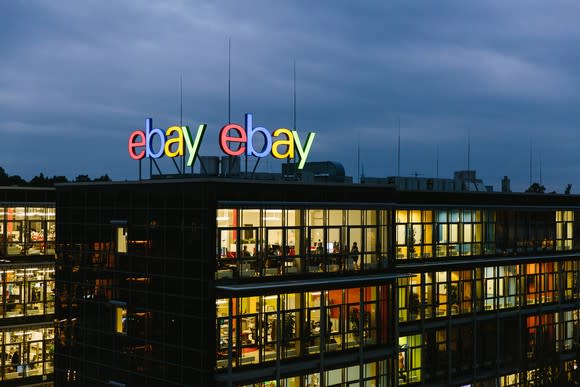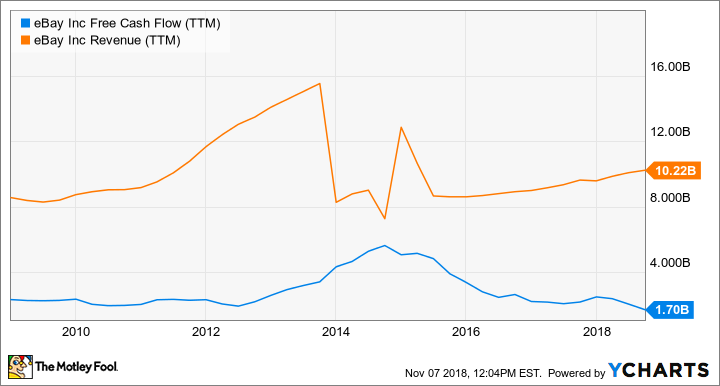Is eBay Inc. a Buy?
It's been a roller-coaster ride for eBay (NASDAQ: EBAY) over the last two years. In 2017, the online marketplace saw accelerated growth in key metrics like gross merchandise volume (GMV), which propelled the stock price up 27%. eBay entered 2018 with momentum, but slowing growth on the top line has weighed on the stock price lately.
After hitting a solid 12% growth rate to start the year, revenue has decelerated over the last two quarters. The stock price is down 20% year to date, which badly trails the S&P 500's gain of 4.2%. The good news is that the company is still growing and is very profitable. So eBay is either a steal trading at a forward P/E of 11.7, based on 2019 earnings estimates, or a value trap.
Here are a few reasons not to buy the stock, and a few reasons why eBay could prove to be a great investment from here.

eBay office in Berlin, Germany. Image source: eBay.
Reasons not to buy
eBay stock has been downgraded by four analysts over the last month. The company's third-quarter earnings report revealed why. Although eBay delivered non-GAAP earnings-per-share growth of 19% over the year-ago quarter, GMV growth decelerated to 5% (excluding currency changes). That's down from 7% growth in previous quarters.
CEO Devin Wenig cited weak results from eBay's marketing efforts for the deceleration. "We made significant marketing investments this quarter with a focus on buyer incentives and top-of-funnel activities, such as our brand campaign," Wenig said. "While some of these activities were successful and will scale, others did not deliver a sufficient return."
This is not what investors want to hear in the context of a strong retail environment. The latest data from the U.S. Census Bureau -- for the second quarter -- showed total retail sales growing 5.7% year over year and e-commerce sales up a robust 15.2% over the year-ago quarter. eBay's growth in the last two quarters has been barely keeping up with total domestic retail sales growth, and is lagging way behind overall e-commerce growth.
The top two brands in retail -- Amazon.com and Walmart -- have been stepping up their game and delivering huge growth rates in e-commerce sales. Amazon's sales from third-party sellers were up 31% in the third quarter, while Walmart posted a 40% growth rate in its e-commerce business in the second quarter. Since 89% of eBay's listings are fixed price, its marketplace segment is in a more direct line of competition with other mainstream retailers.
EBAY Free Cash Flow (TTM) data by YCharts.
Reasons to be optimistic
Despite those negative signs, we have to look at recent performance in the context of the significant changes management is implementing in the marketplace. Management has been rolling out new services and features, which has created some friction with existing users who are used to the old way of shopping on eBay's marketplace.
One of those changes has to do with the ending payments agreement with PayPal Holdings in 2020. Consistent with the basic strategy of its former digital-payments subsidiary, eBay wants to offer its buyers more choice at checkout, which management expects will drive higher conversion rates over the long term.
During the third-quarter conference call, Wenig pointed investors to early evidence that more payment choices are already achieving the desired effect. Wenig said, "[O]ur guest checkout buyers who have historically indexed to credit card payments are showing higher conversion." Also, for the first time, eBay is offering Apple Pay as a payment option, and the service "already has a 12% share of addressable volume" in the marketplace. More payment options are expected to reduce costs for sellers and help them reach more buyers, which should assist in growing eBay's GMV and revenue over the long term.
Another opportunity management is excited about is advertising, which it believes could contribute $1 billion in annual revenue in the next few years, or about 9% of current annual revenue. Marketplace ads are expected to top $600 million this year, with $180 million of that from promoted listings, in which sellers agree to pay eBay an incentive fee if a promoted listing leads to a sale. This has been showing good traction with sellers so far, with revenue from this service growing 120% in the recent quarter.
What's the call?
To be honest, eBay is not my favorite choice to ride the growth of e-commerce, but as long as the company can maintain double-digit earnings growth, it should deliver good returns from here with its low valuation of 11.7 times expected earnings in 2019.
Management expects to grow revenue in the low to mid single digits in 2019, and it expects to achieve double-digit earnings growth in the low to mid teens. The two things investors should love about eBay are that it generates a lot of free cash flow (about 16% of annual revenue) and that management is buying back shares at what could prove to be very undervalued prices when we look back in five years.
More From The Motley Fool
John Mackey, CEO of Whole Foods Market, an Amazon subsidiary, is a member of The Motley Fool's board of directors. John Ballard owns shares of PayPal Holdings. The Motley Fool owns shares of and recommends Amazon, Apple, and PayPal Holdings. The Motley Fool has the following options: long January 2020 $150 calls on Apple, short January 2020 $155 calls on Apple, and short January 2019 $82 calls on PayPal Holdings. The Motley Fool recommends eBay. The Motley Fool has a disclosure policy.

 Yahoo Finance
Yahoo Finance 
